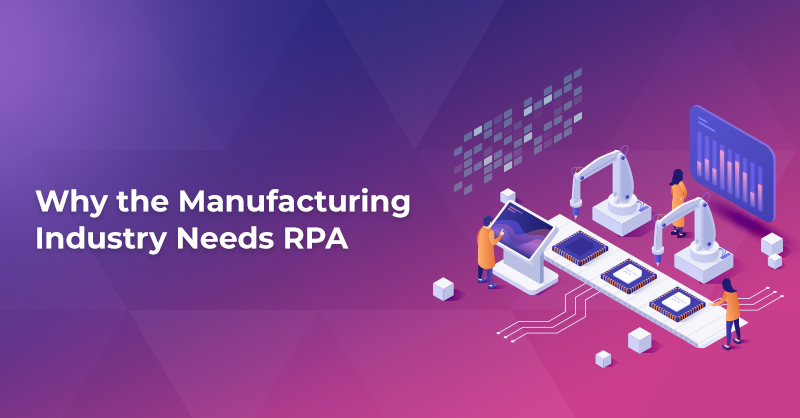Why the Manufacturing Industry Needs RPA

Written by Priya George
Content Writer
October 2, 2022
Industrial robots typically come to mind when understanding the role of automation in the manufacturing industry. There are three types of manufacturing automation based on the level of production that can be carried out: fixed automation for a large volume of production, programmable automation, which is ideal for batch production, and the new age flexible automation, which is essential for real-time, custom production. This form of manufacturing automation involved automatic repetitive processes. However, with the advances in AI and RPA, the decision-making capability of these robots has improved vastly. Thus, they can undertake tasks across the entire process of manufacturing. The supply chain is a major area for RPA adoption. To learn more about advances in industrial robots and the top trends in robotics, read this blog.
Robotic Process Automation (RPA) in the manufacturing industry helps solve several business process issues, including:
- Rectify Labour Shortages: With robotic process automation increasing in capabilities across organizational functions, manufacturing companies are no longer required to hire workers in such large numbers. As a result, shortages in labor are no longer a cause for concern.
- Improved worker safety: By automating manual processes that are highly repetitive and dangerous, automation significantly improves worker safety. Furthermore, by being able to carry out repetitive tasks for longer periods of time, RPA software bots plugged into the IT infrastructure can help workers across various departments produce more output in less time, thus preventing issues such as burnout. Workers can now focus on overseeing the process and troubleshooting issues if needed rather than personally conducting the process.
- Increased Productivity: With tedious, repetitive tasks being taken up by automation, employees are allowed to focus on tasks that involve higher-order skills, such as creativity and critical thinking skills, thus fostering innovation within the organizational culture.
- Reduced Costs: Through the implementation of RPA software, companies only incur a yearly cost for the maintenance of software and machine, which is a fraction of the costs when it comes to getting the same work done by human employees. This helps bring down overall operational costs significantly. Additionally RPA software ensures faster performance, greater accuracy, and reliability.
Read our customer story, where we improved efficiency and reduced manual labor with RPA bots’ help.
Automation within the manufacturing industry has expanded its capabilities to carry out functions across various business processes within manufacturing companies. This has become possible with the help of RPA software technology.
An Overview of RPA in the Manufacturing Industry
Robotic Process Automation is the perfect disruptive technology for the manufacturing industry. By undertaking repetitive daily tasks, RPA improves process execution speed and accuracy. Furthermore, RPA software is a plug-and-play technology that does not require extensive coding expertise to use effectively. Therefore, there are several functions where RPA is indispensable to overall manufacturing automation:
1. Inventory Control
This is a crucial function within the supply chain management process. This requires constant monitoring of inventory levels, keeping track of product reordering, and issuing stock-level alerts. With dashboards and other reporting technology, companies can keep track of potential shortfalls and bottlenecks within the supply chain. Thus, disruptions to the supply chain can be vastly mitigated or eliminated, allowing process optimization and overall improvement.
2. Invoice Processing
Without automation, companies take too much time obtaining, processing, and approving invoices. This process involves bill creation and payment of invoices. Furthermore, approval of the invoice payment and recordkeeping is essential for the process. With RPA, data can be constantly updated in the appropriate target system with zero human intervention. When companies choose to automate invoice processing with RPA, it improves the overall accuracy of the process.
3. Vendor Interaction
A successful supply chain process is essential to the manufacturing industry- and this process heavily relies on successful communication across multiple players- vendors, employees, and customers. From responding to basic queries from customers, monitoring the ERP systems for package status, opening emails, and scheduling meetings, RPA is essential in ensuring that the interaction between the vendor and customer always stays seamless. Download our whitepaper to learn more about how RPA can transform the retail industry
4. IT Operations
Maintaining visibility over IT resources is a challenging task. With the help of RPA, companies can keep track of IT infrastructure and operations, thus ensuring that internal processes within the organization function smoothly. In addition, with RPA, infrastructure audits can be conducted and eliminate potential risks. Even within a manufacturing organization, some departments can be heavily enhanced with the inclusion of RPA within processes and get help with navigating organizational change over the years. Watch our webinar, where we discuss how automation can help prepare for a hybrid workforce in the future.
5. Purchase Order (PO) and Bill of Materials (BOM)
Procurement of materials is an essential process for manufacturing companies. While the bill of materials keeps track of the overall raw materials required, purchase orders are the document for buying goods and services. However, ensuring these two documents are error-proof, sent to the right people, and processed correctly can be tedious for human employees. With RPA, companies can proofread with 100% accuracy, ensure emails are sent to the right people for approval and carry the process forward with zero snags.
The two leaders of robotic process automation, UiPath and Automation Anywhere, offer a wide range of RPA bots designed to carry out these tasks. For instance, with automation Anywhere, companies can leverage RPA to tackle several challenging processes such as: automating ERP, end-to-end logistics monitoring, streamlining purchase orders, and bill of materials. In addition, automation Anywhere for the Manufacturing Industry also offers compliance monitoring and advanced customer support bots.
How Royal Cyber Can Help
Implementing RPA within the business processes of a manufacturing company is easier said than done. Companies need to consult with experts who can help them strategize how to incorporate RPA successfully within every business process and implement this strategy- especially when attempting to automate the supply chain process. With Royal Cyber’s RPA experts, companies can rest assured only the best solution that meets business needs will be considered. Our partnerships with RPA leaders like DataRobot, UiPath, and automation Anywhere ensure our team is up to date on the latest RPA has to offer. To assess the cost of RPA for your company, take the first step and answer our questions on the RPA Process Assessment tool.
For more information, visit our website at www.royalcyber.com or contact us at [email protected].





